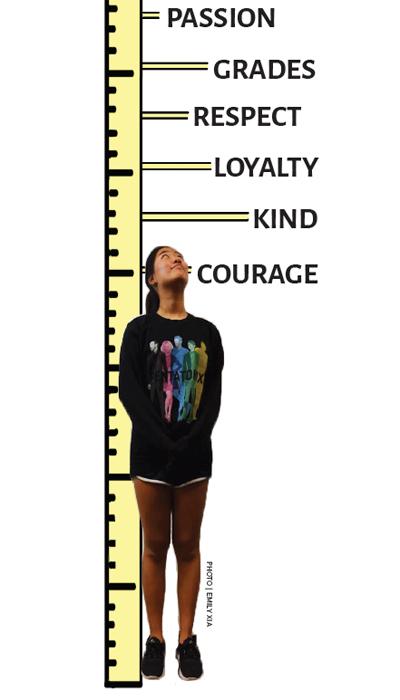Measure up: Different values that individuals hold dear
The way that having different values affects the way individuals measure themselves
October 19, 2017
Contentment.
For senior Kendall Yu, feeling content is what defines her level of fulfillment in life. Her overarching idea of contentment is determined by several factors in her life, ranging from her relationships with other people to maintaining her personal values.
A range of values play an integral part in Yu’s character, serving as factors that she uses to assess how content she is with herself. One value she stresses is remaining open minded to others and not being quick to judge. This was especially prominent in a situation that Yu encountered, when she cut someone out of her life after hearing this friend had spread rumors about her.
“I just automatically [categorized] them as a bad person,” Yu said. “That made me realize I can’t just assume people are good or bad. What they do determines how I see them and how they are.”
Similar to Yu’s perspective, social studies teacher Robyn Brostowicz also measures fulfillment in life based on her values and character in daily interactions. However, she also notes that in the midst of difficult situations, it can sometimes be challenging to carry out these values.
Even so, Brostowicz emphasizes the importance of stopping to assess one’s character.
She upholds these ideals by spreading happiness and managing an Instagram account, which she’s had for five years, solely dedicated to uplifting others.
“Everyday, I post about taking care of your self or being kind to other people — just all these happy things,” Yu said. “People have told me I’ve helped them out. I’ve helped them through hard times or I’ve helped them changed their outlook on life for other people.”
Brostowicz also strives to spread these values into her role as a teacher, demonstrating this behavior for her students. Brostowicz implements this in varying aspects, whether it be in her work or personal life.
“As a mother, I certainly try to teach those values with my own children and there are times when perhaps you get frustrated or upset,” Brostowicz said. “You have to figure out how to work around those frustrations, to still think of others and carry on what it is that is important to you. We’re always going to face frustration — we’re always going to face challenges — but you still need to remember what your values are and to act accordingly.”
For Yu, a part of this is gauging the quality of her relationships with other people and believes that those standards must be achieved in order for her to feel fulfilled in life.
“I’m not a very materialistic person so it sounds really cheesy, but I think the relationships and the connections I make with people are the most important in order for me to be content with my life,” Yu said. “I assess my relationships based on how the other person makes me feel.”
Sophomore Rachel Millar’s opinion mirrors that of Yu’s, believing that the strength of her friendships determine her contentment. A situation when Millar grew distant from a friend due to miscommunication and disloyalty reinforced the importance of values like loyalty in a relationship.
For Millar, using her friendships as a measure of fulfillment in life is a reflection of her own character that extends past just the contentment it brings her.
“When you look at who your closest friends, who tend to stick by you through anything, that’s how you gauge what kind of person you are,” Millar said. “A lot of your qualities are reflected through your friends. There has to be some similarity there or a personality trait that gets along. If you find yourself surrounded with really good people that you enjoy being around and they’re well respected, they try their hardest, then that reflects you as a person.”
Unlike Millar, sophomore Kimberly Chen looks to her athleticism and talent in swimming instead. For her, success and fulfillment in life were two closely intertwined items, with her definition of success mainly based on her performance in swimming.
“I used to gauge my success based on how well I performed at meets and if I beat the people I was racing with — if I beat the times and the goals I set for myself,” Chen said. “I place my self-worth based on how well I did and my self-esteem dropped a lot if I didn’t do well. The worse I did, the worse I thought about myself and it was like a vicious cycle.”
This drop in self-esteem was particularly noticeable for Chen after sustaining a shoulder injury. The combination of her injury and an increasingly packed schedule after entering high school resulted in much less practice than she had before.
Once she did return to swimming after recovering from her injury, the time away from practice had taken a toll on her athleticism and her times during races. Since she measured her success based on her athletic ability and performance, having that taken away resulted in a revelation and shift in opinion for her.
“In the beginning, I felt really depressed because I measured myself on how fast I was and I compared myself with other people,” Chen said. “But now I realized that swimming isn’t all about that. You express your passion through a sport, so you shouldn’t measure based on just a number, like a time.”
Yu comments that though many are like Chen and measure themselves by numbers, this mindset often has harmful effects.
“A lot of people measure themselves by numbers, like grades and weight and it plays a role in a lot of their lives,” Yu said. “That’s really detrimental to their wellbeing and their mental health. People tying themselves to numbers and determining their self-worth by exclusively those things — it doesn’t define them as a person at all. That one little rating can really get them down so measuring themselves by one little thing is really bad for mental health.”
Though Chen realizes that measuring herself and her self-worth solely based on these numbers isn’t ideal, she still struggles to fall out of the habit.
“I still find it hard sometimes to not gauge myself based on how fast I am at swimming,” Chen said. “I used to categorize it for each thing I did — how well did I do it in comparison to other people — like school, sports, extracurriculars, sometimes even looks.”
Yu herself had the same difficulty as Chen, measuring herself in a similar manner. Eventually, she was able to shift her mindset and the method she uses to measure herself.
“I also used to measure myself by what grade I got but then I realized that was really hurting my mental health,” Yu said. “Instead of measuring myself by a grade, I measured myself by if I tried my best, then I was content with myself and I felt successful. Success is when I’m feeling content, when I’m feeling happy with what I’m doing and how I’m feeling.”



















